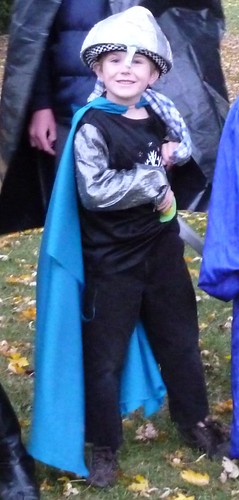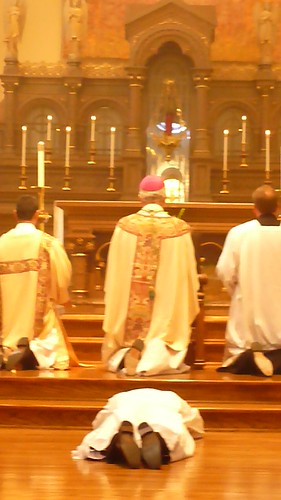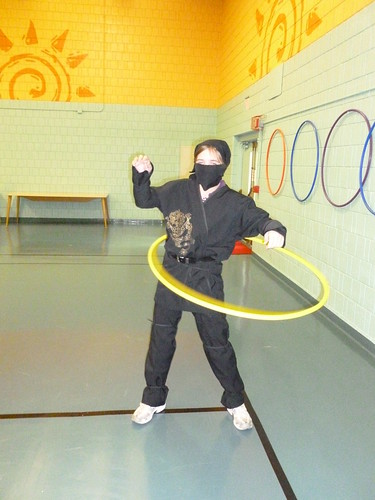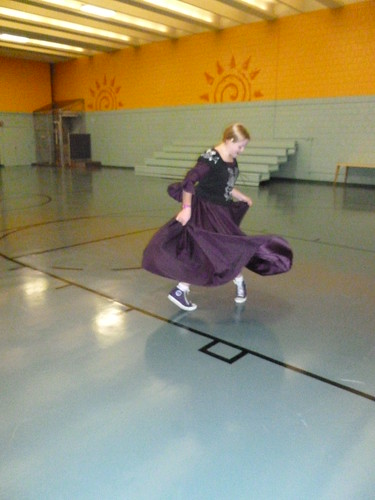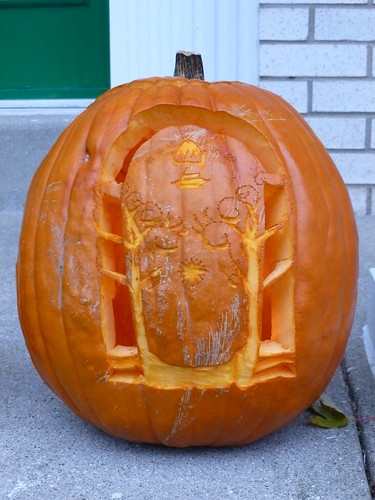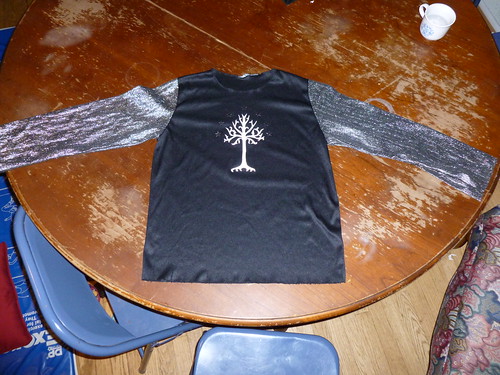I'm still stewing a lot on the ideas about docility and being open to correction that I wrote about in my last post. And while I'm at it, I'd like to thank my alma mater for the shout-out for that post on their Faith in Action Blog.
What I've been thinking about in particular is about how to apply these ideas to raising children in general and to homeschooling in particular. First perhaps, we could consider...
How to Be Sure Your Children Will Not Be Open to Correction
The wrong-headed way to go about it would be to fill your children's lives with as much critique and criticism as possible; to be nit picky about everything they do and say all day long. Nope. Not helpful. Inflicting constant criticism on your children will only make them defensive and insecure.
This is mistake might be an easy one to jump to because our society really has wrong-headed notion of criticism. Again, we tend to think of criticism as an attack on ourselves and an entirely negative thing. What I'm talking about here is a different notion of criticism we're open to learning and growing from each other and willing to bring up questions and concerns and corrections. Really, in a way, what I keep thinking of is a true, deep and open sort of friendship. The roots of this idea are most easily planted and nurtured within the family...
Playing with Ideas
One of the many great things about sharing a meal as a family is that it's the perfect playground for ideas and that's a big part of the point here. We need to be able to treat ideas with a certain amount of "lightness", to be able to detach them from our ourselves, bat them around the table, consider them from different angles and be willing to pull them apart and put them back together with others.
What About Things We Know to Be True?
It's tempting to shelter things we know to be true from such a "light" treatment. After all, even a doctrine of the faith that everyone present holds true is something that will be misunderstood or rejected by others that we encounter. Being able to "play" even with a doctrine can be quite helpful. We need to be willing to look at our beliefs from different angles and to take objections to them seriously (and charitably!) enough to imagine where a non-believer is coming from and help them understand what that belief means to us. It is the Catholic Church, after all, that came up with the concept of the "Devil's Advocate"!
Besides being more prepared to defend and promote our beliefs to others through this process, it is also a great way to move from acting in a certain way out of obedience (not to belittle obedience here!) to really WANTING to follow what the Church teaches.
We never need to fear opening Catholic ideas up for criticism. They really stand up well to reason!
Setting the Tone
Parents play an essential role in modeling all of this: playing with ideas, getting comfortable with having our ideas questioned, and of course learning how to answer questions and delve into the truth of the matter.
Our own tone in discussions, the parents' way of talking to each other and the love we use in how we speak to each other all play a substantial role. Here are some great phrases that we shouldn't be afraid of saying or hearing at our dinner tables:
"I don't know."
"I could be wrong."
"I wonder if...?"
"I don't understand why the Church says..."
"What do you think about..."
Sunday, November 20, 2011
Tuesday, November 15, 2011
Open to Correction Redux
I just had to share this amazing quote from my friend Robert Gotcher's blog, Classic Catholic:
It reminds me a bit of an old blog post I wrote back in 2008, "Open to Criticism", though that one was particularly focused on the subject of criticism from the angle of book reviews.
I strongly believe in the concept of changing the world by changing one's own self. Our culture today, and our human nature in general I suppose, tends to focus on what the other guy is doing wrong. Any critique of myself or my favorite politician (or whatever) is viewed as an attack. I believe that we will never get anywhere good in politics until we hold ourselves and "our side" (whichever side that may be) accountable for our faults and stop making excuses.
I think this is related to part of what makes traditional liberal arts education (such as what my husband and I encountered at Thomas Aquinas College) so valuable - especially in an age where education is so often considered to be equated with a list of information stored in one's head.
In our round-table, seminar-style classes, we learned to take some else's ideas, make sure we understood them, formulate our own opinions about the material, articulate those opinions to others and thus lay them open to challenge and critique. We had to sort out the criticism as objectively as possible in a context that helped us not just respond emotionally to the fact that someone disagreed with us, but work our way through the questions and problems in a reasonably logical manner. The whole program helped us to develop skills that I find myself using on a daily basis in the real world - to fully understand what others are saying and respond in an appropriate, not a reactionary manner.
Here are a few other quotes that seem relevant to this concept:
"Back in the 1940s and '50s and '60s, men believed that the best friends that you could have were the ones who would openly criticize your work and lay bare to you the mistakes and errors that you made, so that you might learn from them and correct them. In today's world, if someone criticizes your work openly, it has become fashionable to hate them for it. That is extremely foolish. You cannot learn from someone who always agrees with you; you can only learn in the fire of disputation and dialectic." --Douglas Gresham in an interview in Columbia Magazine.
It reminds me a bit of an old blog post I wrote back in 2008, "Open to Criticism", though that one was particularly focused on the subject of criticism from the angle of book reviews.
I strongly believe in the concept of changing the world by changing one's own self. Our culture today, and our human nature in general I suppose, tends to focus on what the other guy is doing wrong. Any critique of myself or my favorite politician (or whatever) is viewed as an attack. I believe that we will never get anywhere good in politics until we hold ourselves and "our side" (whichever side that may be) accountable for our faults and stop making excuses.
I think this is related to part of what makes traditional liberal arts education (such as what my husband and I encountered at Thomas Aquinas College) so valuable - especially in an age where education is so often considered to be equated with a list of information stored in one's head.
In our round-table, seminar-style classes, we learned to take some else's ideas, make sure we understood them, formulate our own opinions about the material, articulate those opinions to others and thus lay them open to challenge and critique. We had to sort out the criticism as objectively as possible in a context that helped us not just respond emotionally to the fact that someone disagreed with us, but work our way through the questions and problems in a reasonably logical manner. The whole program helped us to develop skills that I find myself using on a daily basis in the real world - to fully understand what others are saying and respond in an appropriate, not a reactionary manner.
Here are a few other quotes that seem relevant to this concept:
Most people tend to allow the truth they possess so to dominate their thinking that they see few other truths that place their one truth in perspective and balance it out. There is probably no heresy in the history of the Church that did not have its truth. The problem invariably is that the one truth so took over the heretic's mind that he was committed to cast out any number of other doctrines that clashed with his interpretation of it. (pg. 34, Authenticity by Fr. Thomas Dubay)
"It is the mark of an educated mind to be able to entertain a thought without accepting it." Aristotle
This last one, again is from Dubay's Authenticity, in which he discusses the word "docility":
The word means, of course, a capacity to learn, to be taught by another. Yet in recent years the idea came upon hard days, for it spoke to many of a passivity, a weakness, a refusal to think for oneself. But then on the scene came a new label: openness, listening. Now openness and listening to others mean nothing if they do not mean exactly what docility means: willingness to be informed, instructed, changed by what another says.
A man in trouble laments that he did not listen to his teachers, and thus he finds himself in a sad state, utter ruin. A candid admission of a blunder is refreshing and not often heard in human affairs. It is the saint alone who is large-minded enough to think and speak in this way. This is part of his authenticity.
The person who is swift to hear and slow to respond is a stranger to an all-knowing illuminism. He believes that others, too, have some truth, and he is willing to be instructed by them. He is ready for the mind of God.
We are to welcome instruction, yes. But this is not enough. We are to welcome correction as well, being told that we are wrong. This is living the virtue of docility.I think the virtues of humility and gratitude are also closely related, which, of course reminds me of St. Francis:
As the word indicates, docility is the capacity to learn, a willingness to be taught. One is docile when he recognizes his own lack of information and expertise, on the one hand, and the superior knowledge and skills of his teacher, on the other. In this context a synonym more acceptable to modern ears is receptivity.
There are two types of receptivity: one toward the indwelling Spirit and the other toward human teachers. Like other moral virtues, docility lies in a mean between two extremes. One extreme is the more or less arrogant refusal to accept the thoughts of another. The other is an exaggerated credulity that has lost a sense of proper discrimination and healthy criticism.
...his first reaction was always gratitude. He accustomed himself, in everything that happened in his life, always first and foremost to praise and to give thanks, even before he knows what it is, in fact, that he has received, even before he accepts what he receives, looks at it, and gives it shape. (from Book of All Saints by Adrienne Von Speyr - chapter on St. Francis of Assisi)
Friday, November 11, 2011
Thursday, November 10, 2011
Deacon Carlos' Ordination
John and I and Terri attended the diaconate ordination of one our "adopted" seminarians on Saturday. It was beautiful! Please keep him and his ministry in your prayers!
Yoda Pumpkin
Gus had fun carving this Yoda pumpkin with some help from a template found somewhere online.
Costume Fun
Bernie decorated this knight-costume shirt (from a rummage sale) with stickers to make a White Tree of Gondor for Frank's "Pippin" costume. She later ended up tracing the tree and painting it on with white puffy paint.
Tuesday, November 01, 2011
Our Kids on PBS ;)
Our two oldest - Ria and Gus - joined a parish mission trip to Virginia last summer. It turns out that they and a bunch of their friends from the trip ended up in a PBS piece when they visited a local music event. Gus is the tall one in the green shirt (Ria is harder to spot)...
On The Crooked Road: Pickin' in the Pound from Carol Jennings on Vimeo.
Subscribe to:
Posts (Atom)

